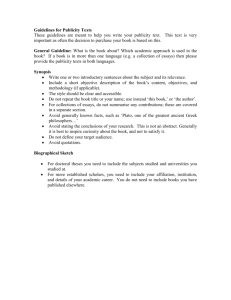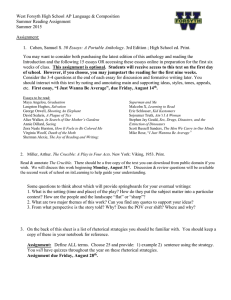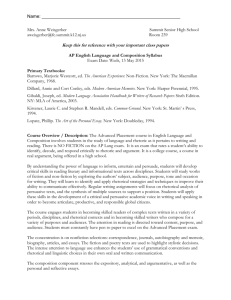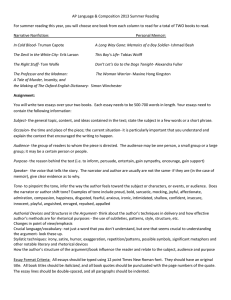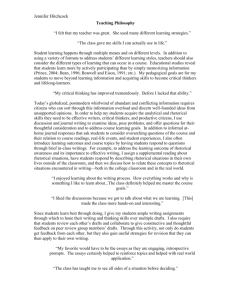Advanced Placement Language and Composition
advertisement
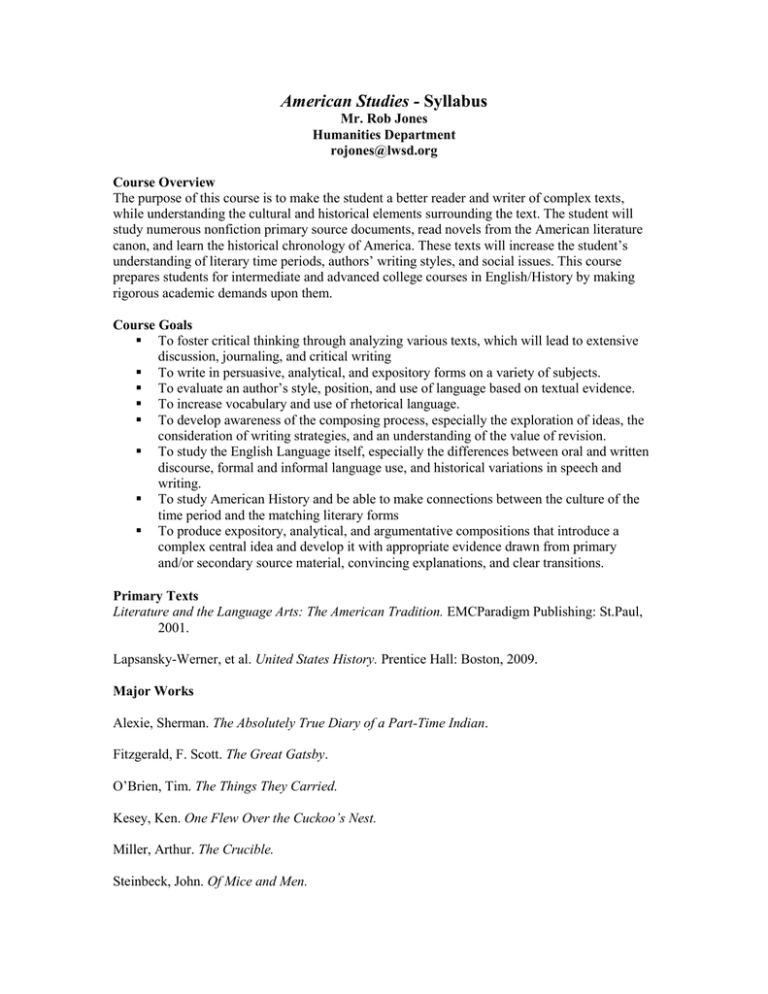
American Studies - Syllabus Mr. Rob Jones Humanities Department rojones@lwsd.org Course Overview The purpose of this course is to make the student a better reader and writer of complex texts, while understanding the cultural and historical elements surrounding the text. The student will study numerous nonfiction primary source documents, read novels from the American literature canon, and learn the historical chronology of America. These texts will increase the student’s understanding of literary time periods, authors’ writing styles, and social issues. This course prepares students for intermediate and advanced college courses in English/History by making rigorous academic demands upon them. Course Goals To foster critical thinking through analyzing various texts, which will lead to extensive discussion, journaling, and critical writing To write in persuasive, analytical, and expository forms on a variety of subjects. To evaluate an author’s style, position, and use of language based on textual evidence. To increase vocabulary and use of rhetorical language. To develop awareness of the composing process, especially the exploration of ideas, the consideration of writing strategies, and an understanding of the value of revision. To study the English Language itself, especially the differences between oral and written discourse, formal and informal language use, and historical variations in speech and writing. To study American History and be able to make connections between the culture of the time period and the matching literary forms To produce expository, analytical, and argumentative compositions that introduce a complex central idea and develop it with appropriate evidence drawn from primary and/or secondary source material, convincing explanations, and clear transitions. Primary Texts Literature and the Language Arts: The American Tradition. EMCParadigm Publishing: St.Paul, 2001. Lapsansky-Werner, et al. United States History. Prentice Hall: Boston, 2009. Major Works Alexie, Sherman. The Absolutely True Diary of a Part-Time Indian. Fitzgerald, F. Scott. The Great Gatsby. O’Brien, Tim. The Things They Carried. Kesey, Ken. One Flew Over the Cuckoo’s Nest. Miller, Arthur. The Crucible. Steinbeck, John. Of Mice and Men. Course Structure 1st Quarter Literature/History Focus: The Road to Freedom Instructional Focus Introducing rhetorical analysis and its importance in understanding an author’s purpose; using rhetorical analysis to structure written responses to essays. Vocabulary Focus: Students will learn to incorporate active verbs into their writing and how to vary sentence structure. By reviewing peer’s essays and White’s writing, students will see examples of both active verbs and varied sentence structures. Essays (usually nonfiction) studied to practice close reading strategies Virginia Woolf – “The Death of the Moth” / “Two Dinners” Mark Twain – “The War Prayer” / “Advice to Youth” / “Reading the River” Katha Pollitt – “Does the Literary Canon Really Matter?” N. Scott Momaday – “The Way to Rainy Mountain” Writing assignments based on nonfiction texts studied Dialectical journals for each nonfiction text Open response essay on universal theme about rites of passage based on Momaday’s writing Literature Studied Arthur Miller – The Crucible o Socratic Seminar # 2 from the Iroquois Constitution Jonathan Edwards – from “Sinners in the Hands of an Angry God” Nathaniel Hawthorne – “Rappaccini’s Daughter” Benjamin Franklin – from The Autobiography of Benjamin Franklin History Studied Prehistory of America The American Colonies The American Revolution & the Constitution Religion & Reform 2nd Quarter Literature/History Focus: The Road to the Imagination Instructional Focus The relationship between speaker and audience, tone, and persuasive arguments. Vocabulary Focus: Students will learn rhetoric vocabulary, essential to their success in writing. Essays studied to practice close reading strategies Thoreau- excerpts from Walden and Civil Disobedience Emerson- excerpts from Self-Reliance and Nature John Muir – “A Wind-Storm in the Forests” Long & Short Fiction studied to practice close reading strategies John Steinbeck – Of Mice and Men o Socratic Seminar Edgar Allan Poe – “The Pit and the Pendulum” / “The Raven” Washington Irving – “The Devil and Tom Walker” History Studied The Civil War & Reconstruction Transcendentalism & Romanticism Realism and the Progressive Era World War I Writing assignments Dialectical journal for Of Mice and Men Rhetorical analysis essay for Of Mice and Men 3rd Quarter Literature/History Focus: The Long and Winding Road to the American Dream Instructional Focus Aristotle’s rhetorical appeals, narration, metaphoric language, relationship between speaker and audience, overall review of rhetorical techniques and approaches to language and composition Vocabulary Focus: Students will learn to incorporate active verbs into their writing. They will also learn rhetoric vocabulary, essential to their success in writing. Nonfiction texts studied to practice close reading strategies Susan B. Anthony – “Women’s Right to Suffrage” Chief Joseph of the Nez Perce – “I Will Fight No More Forever” o Socratic Seminar Zora Neale Hurston – “How It Feels to be Colored Me” Fiction studied to practice close reading strategies F. Scott Fitzgerald – “The Sensible Thing” / The Great Gatsby o Socratic Seminar Ernest Hemingway – “A Clean, Well-Lighted Place” William Faulkner – “A Rose for Emily” Eudora Welty – “A Worn Path” History Studied The Modern Era Harlem Renaissance World War II / Postwar America Writing assignments Synthesis essay project for Modernism – Students in cooperative groups will create and answer a synthesis essay prompt and conduct research on primary sources. Dialectal journals for The Great Gatsby Argumentative essay based on Chief Joseph’s piece Research Paper American Literature: Students will choose a topic that has something to do with American Literature from the 20th century and do research based on that idea. Students will use proper MLA format with a minimum of 5 sources in a 4-5 page paper. 4th Quarter Literature/History Focus: The Road to the Future Instructional Focus Aristotle’s rhetorical appeals, metaphoric language, relationship between speaker and audience, language as a negotiation between self and world, tone. Vocabulary Focus: Students will review rhetorical vocabulary from the first three quarters. Students will also continue to study vocabulary taken from SAT prep lists. Essays studied to practice close reading Daniel J. Boorstin – “Why I am Optimistic about America” John F. Kennedy – Inaugural Address David Sedaris – “Me Talk Pretty One Day” Joan Didion – “On the Mall” Fiction studied to practice close reading strategies Ken Kesey – One Flew Over the Cuckoo’s Nest John Updike – “The Slump” Joyce Carol Oates – “Journey” Tim O’Brien – The Things They Carried o Socratic Seminar Writing assignments based on nonfiction texts Rhetorical analysis and response dealing with Satire Writing assignments based on fiction texts Dialectical journal for The Things They Carried Open response essay based on the universal theme: the fallacy of the American Dream. History Studied Civil Rights Movement Vietnam and the Era of Protest Crisis in Confidence Into a New Century Description of Assignments Quizzes, Minor writing = 35% of grade each quarter Students will be assessed on their understandings of texts based on rhetorical analysis, synthesis, and universal themes throughout the seminar. Vocabulary and literary term quizzes will be given once every 2 weeks. Tests, Essays, & Projects = 40% of grade each quarter Students will study rhetorical terms/approaches to understanding language. Students will take tests that focus on the specific literature/history contained in that unit. Independent novel assignments, as well as other long-term studies and essays, will fall in the scope of this category Out of class essays and research papers will be assessed with a standard rubric. Daily work, Homework, and Dialectical Journals = 25% of grade each quarter Teacher feedback will occur periodically throughout journal assignments; students must show sufficient evidence to receive full credit. Full classroom participation is an absolute necessity to this class. Given the nature of debate and dialogue, students will need to come to class prepared to discuss any relevant topic in regard to literature or history. ***Grades will appear in a class titled “American Studies” on Standardscore. Though the on-line program shows the class as 2 different classes, I will place all grades in one class called “American Studies.” Expectations/Policies Late Work: : Your work must be turned in on time or you will not receive full credit. Late work may be turned in for half credit up to 1 week past the due date. Some homework assignments are graded for completion and may not be turned in late. Major papers are worth a lot of your grade; be careful to have those in on time. If you feel you need an extension you must meet with me in person more than 24 hours in advance. You may not ask for an extension on the due date or via email. Make-Up Work: If you are absent (excused) from school you may make up the work that you missed. There is an assignment book that will list what you missed on any given day; this book is on the corner of my desk. A tray for make-up work will be found in the back of the room, as well. Pre-announced tests and pop-quizzes must be taken on the day the student returns to school unless previous arrangements have been made. Leaving the Classroom: Since many of the activities and readings will be done as a class to provide enrichment, your physical presence in the classroom is imperative. You should not expect to leave the classroom often or without good reason. The schedule provides ample time for you to use the bathroom in-between classes. Tardiness: Punctuality is an important part of life and this class. For this reason, I do keep track. Being here to participate is part of your grade. For each tardy, you lose a class participation point for that day. Additionally, 4 tardies = 1 Unexcused absence from the class. Materials: 1. Bring a writing utensil. (one will not be provided by me) 2. 3. 4. 5. Bring your notebook, journal, and textbook. Post-its & highlighters are highly recommended. A thumb/flash drive It is my recommendation that students buy novels so that they can practice annotating in them. Eastlake HS provides copies of novels, but I give extra credit for possessing your own copy. Teacher Expectations: A. Teacher will provide timely feedback on all graded assignments. B. Teacher will treat all students equally. C. Teacher will maintain the classroom, making it an environment conducive to learning. D. Teacher will be prepared for class every day. Student Expectations: A. Students will be respectful to fellow classmates and teachers. B. Students will report on time to class and be prepared. C. Students will complete assignments on time and to the best of his/her ability. Classroom Rules: Respect each other—each other’s work, property, ideas, beliefs, etc… Respect yourself – put forward your best effort. Respect your teacher. All handbook rules apply. This includes, but is not limited to, dress code, electronic devices, and attendance requirements. No backpacks, food, or uncapped beverages will be allowed in the classroom. ________________________ ________________________ I have read the above material, including rules and expectations, and I place my signature below to bear witness to that fact. Please cut at line above and return to Mr. Jones. Student Name (Printed) ____________________________ Student Signature ________________________________ Parent/Guardian Signature ______________________________
